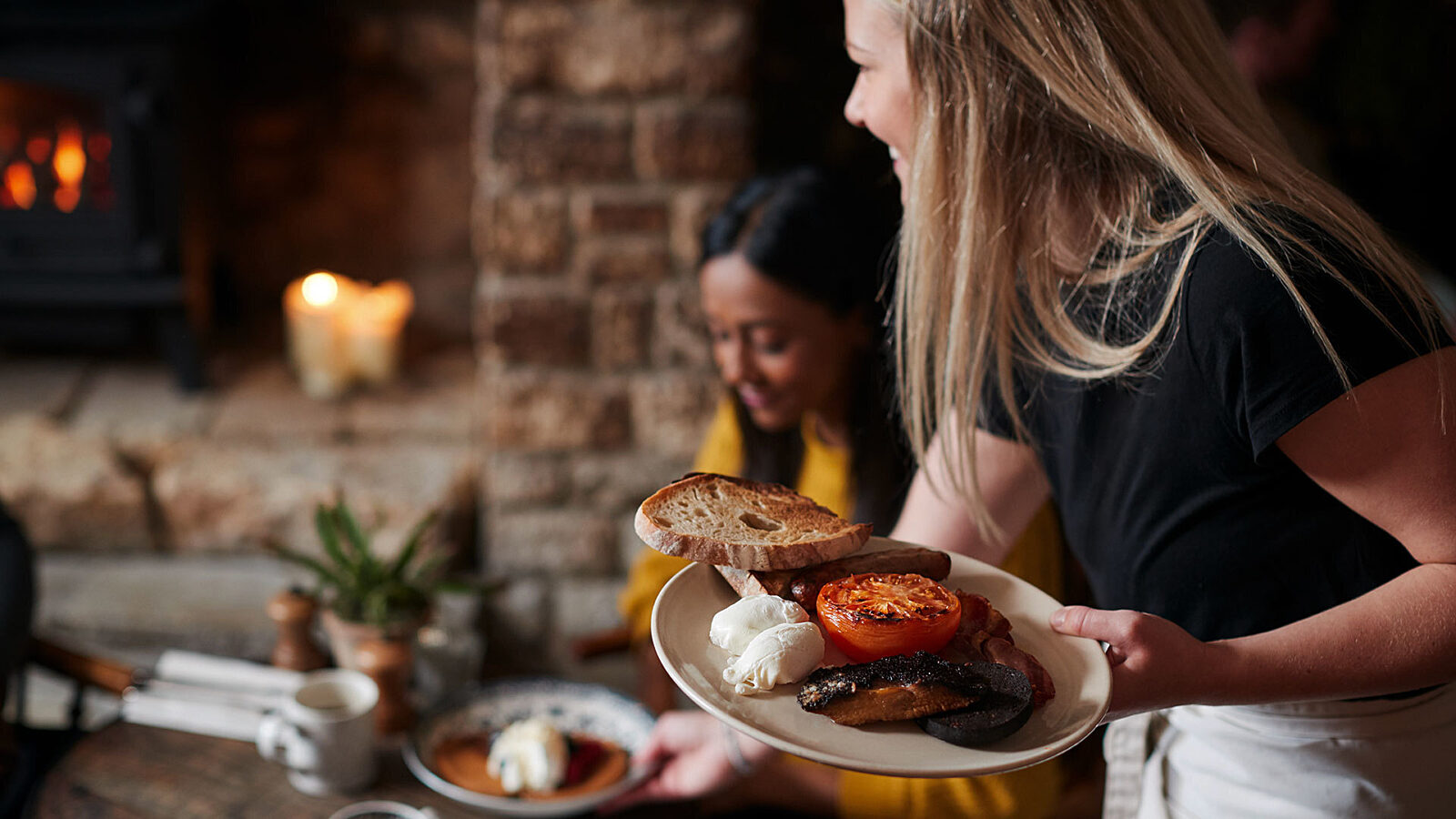
How to Hire for Hospitality Skills
Front-of-house hospitality skills and great customer service go together like happy staff and family meals.

Isabelle HahnAuthor
Danny Meyer, CEO of Union Square Hospitality Group, wrote about the power of hospitality in his must-read book, Setting the Table. “My appreciation of the power of hospitality and my desire to harness it have been the greatest contributors to whatever success my restaurants and businesses have had. I've learned how crucially important it is to put hospitality to work, first for the people who work for me and subsequently for all the other people and stakeholders who are in any way affected by our business — in descending order, our guests, community, suppliers, and investors.”
Hospitality skills need a high spot on your hiring checklist. It's easy to assume that candidates are coming in with a basic grasp of hospitality skills — they're vying for a spot in the restaurant industry, after all. They should know how this works.
Looking at hospitality as a given rather than a learned emotional skill set is a mistake. This can be the difference between hiring an employee who only looks after themselves and an employee who’s driven by being a team player. Even if that person doesn't have years of experience, we'd choose a hospitable team player who needs a little training any day of the week.
Unbeatable customer service begins with hospitality. And as a restaurant owner, you need your employees to value hospitality. A restaurant's staff members shape the guest experience, and it can be hard to rectify a bad impression.
Hospitality Comes First in Hiring
Hospitality is cyclical for both guests and potential employees. If someone comes into your restaurant and has a terrible experience, they'll probably mention it to the next person who suggests it for dinner.
Likely, candidates who are interested in applying to your restaurant have at least heard of your establishment. Maybe they've asked their friends about it. Perhaps they know someone who already works for you.
Word of mouth travels fast. It is also the most effective marketing tool. If one person says that your restaurant didn't offer the most hospitable environment, that's a huge red flag for anyone who was considering applying in the first place.
Let's say that a person has only heard good things about your restaurant and makes it through the first round of interviews. Regarding them in a rude or slightly unwelcoming manner is another way of sending them straight to your competitor. Asking an employee to put on a smile and showcase excellent customer service after making them jump through hiring hoops is not only exhausting for them, it's a complete turn-off. It's also a one-way ticket to ensure they quit within the year.
At any point of entry, a candidate's first experience of your company should be a positive one. And just because a candidate comes in for an interview, doesn't mean they've decided yours is the restaurant for them. Only 68% of job offers are accepted – a stat that has been steadily declining since 2015 as the economy has improved – and you now have even further incentive to provide a hospitable environment to each candidate that shows up at your door (and throughout every touchpoint in the hiring process).
View Hospitality as a Technical Skill
Looking for candidates with technical skills already listed on their resume is an easy way to hire. The draw of technical experience is undeniable: You won't have to train that person as hard because they aren't a beginner.
The best part about a candidate lacking a technical skill is that you can train them to do it. You should view hospitality skills in the same way.
In Setting the Table, Danny Myers writes, “I've learned that we need to hire employees with these skills if we're to be champions at the team sport of hospitality.” Those qualities are optimistic warmth, intelligence, work ethic, empathy, self-awareness, and integrity.
Nobody is born knowing how to bus a table. Just like nobody is born knowing how to greet a guest with optimistic warmth after a dinner rush, a bad tipper, and eight straight hours on their feet. Qualities like warmth and self-awareness may seem innate, but in the restaurant industry, that all goes out of the window. We're all trying not to lose our heads and that pressure takes real-life experience to get used to.
When taking your employees through training, there is one thing that is especially important to reiterate when trying to build hospitality skills: Patience. If your employees have the patience for the most trying guests, they can act with self-awareness and integrity. They listen to Karen – who's insisting that your waiters mistakenly served her decaf and has now asked to see the manager – and react with patience.
Use Behavioral-Based Interview Questions
When searching for that perfect, hospitably-minded candidate, the best thing to do is allow them to prove how well they know their stuff.
By asking behavioral-based questions in the interview, you can accurately gauge whether or not the experiences they've listed on their resume match what you're looking for in an employee.
Behavioral interview questions focus on how a person handled past situations or how they would respond to new problems based on previous experiences. These questions give key indications to a candidate's problem-solving skills and personality.
Past behavior will likely predict how this person behaves in your restaurant, so having behavioral interview questions prepared – as well as an idea of what you're looking for – will help in your search.
To come up with an actionable behavioral question, think about a reoccurring or significant issue happening in your restaurant. Maybe one of your food suppliers is always late, and a regular comes in for their usual Tuesday burger. Unfortunately, you don't have any buns left from last week. How would your candidate handle a situation like that?
You could also ask questions that lead to how this person interacts with other staff. Let's say you have one hostess who sometimes forgets to rotate sections. How would this new person solve that situation? Would they bring it up to management first, or try to resolve the issue on their own?
General examples of behavioral interview questions:
- Please give an example of how you've solved a problem on the floor quickly.
- Could you describe a stressful situation you've faced in a restaurant and how you handled it or communicated it to managers?
- Tell me about a mistake you made with a customer and how you handled it.
- Could you give me an example of a decision you made for the customer without checking-in with management first? Why did you end up making that decision?
- Have you ever dealt with company policy you weren't in agreement with? How?
Interview Questions Template
With culture questions, experience questions, and situational questions, this customizable Word doc will guide your interviews with prospective candidates.

Train Your Staff on Guest Service
Your staff members are the face of your restaurant; the physical embodiment of the brand, mission, and vision you're working to move forward. To train them in the art of top-notch hospitality, they have to have a deep understanding of why they want to represent your restaurant in the first place.
Service with a forced smile doesn't cut it in the game of hospitality. People are smart and can sense what someone is ingenuine. Today's restaurant-goers are expecting a memorable dining experience with warm, genuine hospitality seamlessly interwoven through every part of their visit, from the moment they make a reservation online up until they sign their receipt.
Preparing your staff with hospitality training before they start their first shift will ultimately equip them with the skills they need to deal with your toughest customer. Checking in with your current staff about hospitality will also help to reinforce those skills with new team members.
It's important to remember that incorporating hospitality skills into your training is also crucial for your culture and team. Having one person who loses their cool over and over again makes for the same toxic, brash workplace environment that the restaurant is infamous for in the first place.
Growing your hospitality skillset is a daily task, one that your front of house staff should focus on improving every shift. Hiring employees with a basic understanding of hospitality skills is only the first step, reinforcing those skills and continually reminding your team what hospitality means for your restaurant will help you deliver a world-class experience that improves the environment for your guests and your team.
Is this article helpful?
DISCLAIMER: This information is provided for general informational purposes only, and publication does not constitute an endorsement. Toast does not warrant the accuracy or completeness of any information, text, graphics, links, or other items contained within this content. Toast does not guarantee you will achieve any specific results if you follow any advice herein. It may be advisable for you to consult with a professional such as a lawyer, accountant, or business advisor for advice specific to your situation.
Read More
Subscribe to On the Line
Sign up to get industry intel, advice, tools, and honest takes from real people tackling their restaurants’ greatest challenges.

